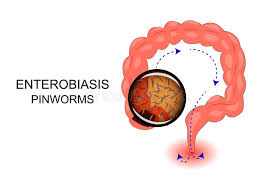Enterobiasis,also known as pinworm infection is caused by Enterobius vermicularis.
The infection is acquired by ingesting the worm eggs.The period of time from swallowing eggs to the appearance of new eggs around the anus is 4 to 8 weeks.Infection occurs only in humans; there is no animal reservoir or vector.
Signs and symptoms:
It is asymptomatic in about one-third of the people.The most prominent symptoms include Perianal pruritis;itching in and around anus and perineum.
Pinworm usually doesn’t cause skin infection but it can move to vulva in women and this can cause vulvovaginitis, i.e. an inflammation of the vulva and vagina. This causes vaginal discharge and pruritus vulvae, i.e., itchiness of the vulva. The pinworms can also enter the urethra, and presumably, they carry intestinal bacteria with them.
Diagnosis:
Pinworm infection can be diagnosed by following techniques;
- Scotch tape technique:eggs are recovered from perianal skin by using scotch tape and can be observed under microscope.
- Small,whitish adult worms can be found in the stools or near the anus of diapered children.
Treatment:
The drug of choice for the treatment of pinworm infection are either albedazole,mebendazole or pyrantel pamoate.
These drugs kill the adult worms in the colon but not the eggs,so retreatment in 2 weeks is suggested.
Prevention:
Preventative action revolves around personal hygiene and the cleanliness of the living quarters.The rate of reinfection can be reduced through hygienic measures, and this is recommended especially in recurring cases.The main measures are,
- keeping fingernails short, and washing and scrubbing hands and fingers carefully, especially after defecation and before meals.
- bed covers, sleeping garments, and hand towels should be changed daily.
- Simple laundering of clothes and linen disinfects them.
- Children should wear gloves while asleep, and the bedroom floor should be kept clean.
- Food should be covered to limit contamination with dust-borne parasite eggs.
- Household detergents have little effect on the viability of pinworm eggs, and cleaning the bathroom with a damp cloth moistened with an antibacterial agent or bleach will merely spread the still-viable eggs. Similarly, shaking clothes and bed linen will detach and spread the eggs.






